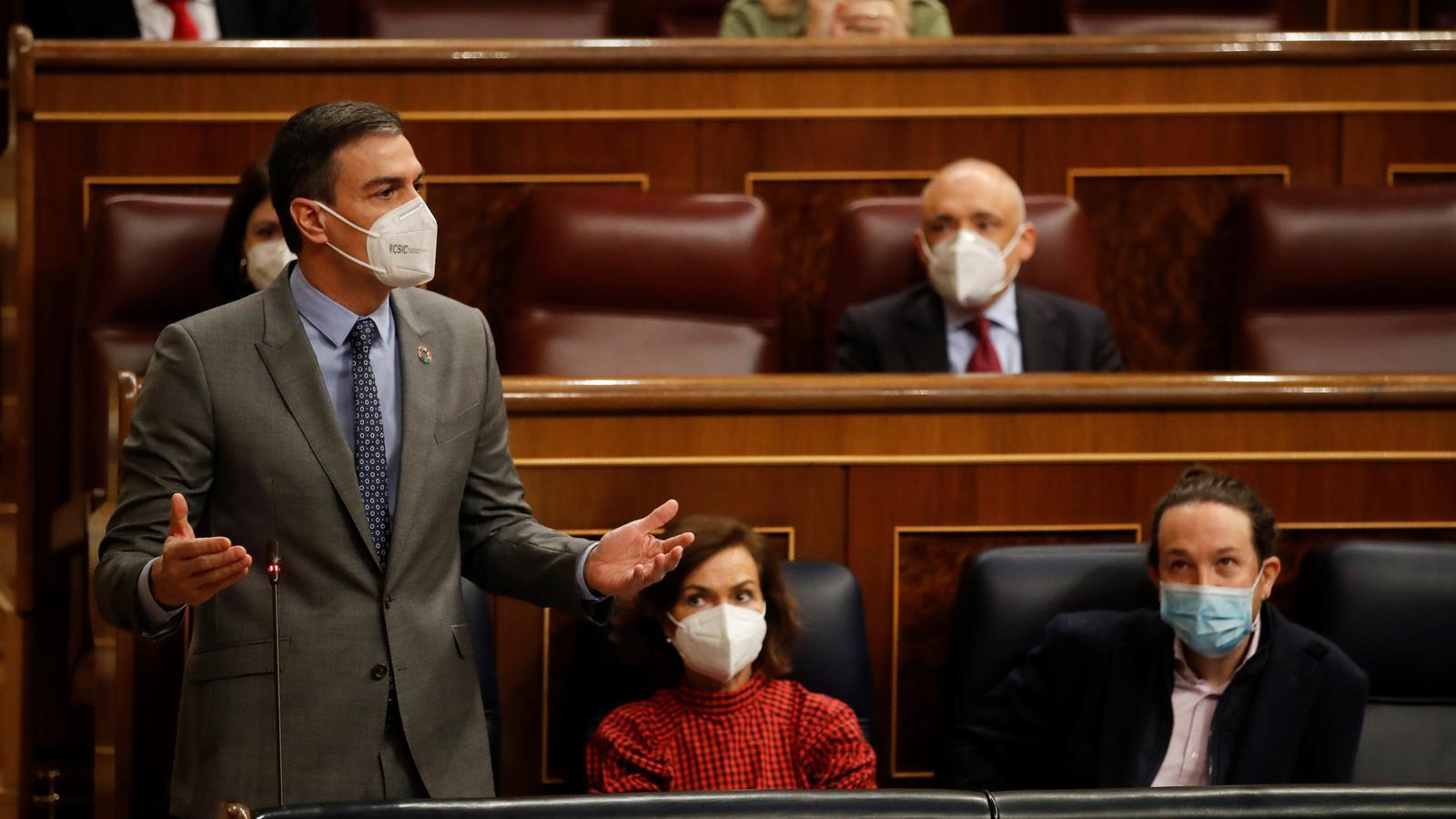Spanish Government defends a PSC-Comuns agreement but privately counts on Aragonès to be president
Sánchez believes that it is necessary to isolate Vox and JxCat, which he puts in the same bag, for feeding "expressions of hatred and xenophobia"

MadridPedro Sánchez takes sides for the first time after the Catalan elections. A day after the Moncloa down-played the fact that pro-independence parties obtained 51% of votes, the Spanish president has defended that the results indicate that the Catalans want the formation of a PSC government with the comuns. During the first control session in Parliament after 14-F, the socialist leader has put Vox and Junts per Catalunya in the same bag for feeding "expressions of hatred and xenophobia", and has bet for the next government to be "different" and "progressive", "led by the socialist party and the comuns". This is what he interprets Catalan society is asking for because he believes the results show that the only way out is "left-wing" and it includes "a reunion and dialogue within the law".
Sánchez has thus responded to the new spokeswoman of Junts per Catalunya in the Spanish Parliament, Míriam Nogueras, after the departure of Laura Borràs to the Catalan Parliament. The Spanish president believes that JxCat has to be at all times "out of the equation" for being a "conservative formation" that has only led to "blockage". Moreover, he has argued that we must "isolate" the expressions of xenophobia and hatred of Vox and also prominent "members" of the candidacy led by Borràs.
Now, the reaction of Sanchez contrasts with what the Moncloa and the PSOE say in private. Socialist sources already admitted Sunday that the option of a left-wing government was unfeasible and that the only way out is that the ERC candidate, Pere Aragonès, would end up governing with the support of the pro-independence parties. A government between the PSC and the comuns with the support of the Republicans was the initial bet of the Moncloa, but as the campaign progressed, they assumed that even if Illa won the elections, he would end up in the opposition as Inés Arrimadas did in 2017.
This Wednesday, sources in the Spanish government have insisted that Illa "will run in the elections to show that there is another possible majority", but have admitted that it will be Aragonès who will have the upper hand. They say that "he will not let the opportunity pass" and that "the elections will not be repeated". In addition, they consider that the investiture again of a pro-independence government, but this time headed by ERC, "does not have to cause problems in the relationship with Esquerra" since there are "many pending issues".
JxCat assures that the pro-independence movement will understand each other
Nogueras refuted him - while the ERC spokesman, Gabriel Rufián, looked at his mobile phone - that the pro-independence supporters will come to an agreement "out of responsibility and for the country" and because "the mandate is clear and resounding": "On Sunday the Catalan Republic won and it did so with more than 50% of the votes". Sánchez, in fact, has not even mentioned the balance of power and has clung to defend the resounding "victory of Salvador Illa", who in his opinion still has "more merits" after, in his opinion, all the "slander" he received in the final stretch of the campaign. "It is clear that there is a conflict between parts of Catalan society and there is a demand for a reunion within democratic legality", he insisted.
Right at the end of the control session in Parliament, a motion by ERC to defend an agreed referendum will be debated. The PSOE has already announced that it will vote against it - the first vice-president, Carmen Calvo, reiterated yesterday that it is "unconstitutional" - and Unidas Podemos will abstain. The purple party considers that it is not "serious" to bring this issue to the chamber when there is no government and the dialogue table has not been reconvened.
Coldness between PSOE and United Podemos
Sánchez's bid to repeat the state coalition government in Catalonia contrasts with the climate in which the PSOE and Unidas Podemos have been living in recent weeks. For the first time, no socialist MP or minister has applauded the interventions of the second vice-president of the Spanish government, Pablo Iglesias. It has been two days since the Catalan elections, but the constant climate of confrontation between the two forces has not ceased. Yesterday, Tuesday, they broke for the first time the unity of vote in the processing of a law: the purple party abstained in the vote on the law of equal treatment and socialist discrimination because they consider that it does not take into account the coalition agreement, which should be promoted hand in hand with the trans law -criticised by Calvo- and the LGTBI law.
The leader of the opposition, Pablo Casado, on Wednesday dipped his toe into the division between partners and once again called on Sánchez to dismiss Iglesias. The Spanish president defended the need for "stability" and asked Casado to adopt "the path of moderation that the Catalan elections have taught him". After having praised Vox in the last control session for saving the approval of the decree on European funds, on Wednesday he returned to the attack against the extreme right and called on the PP to "choose the path of moderation". In fact, he urged the leader of Ciudadanos, Inés Arrimadas, to break the regional and local pacts with Vox "because the ultra-right is eating them up".
